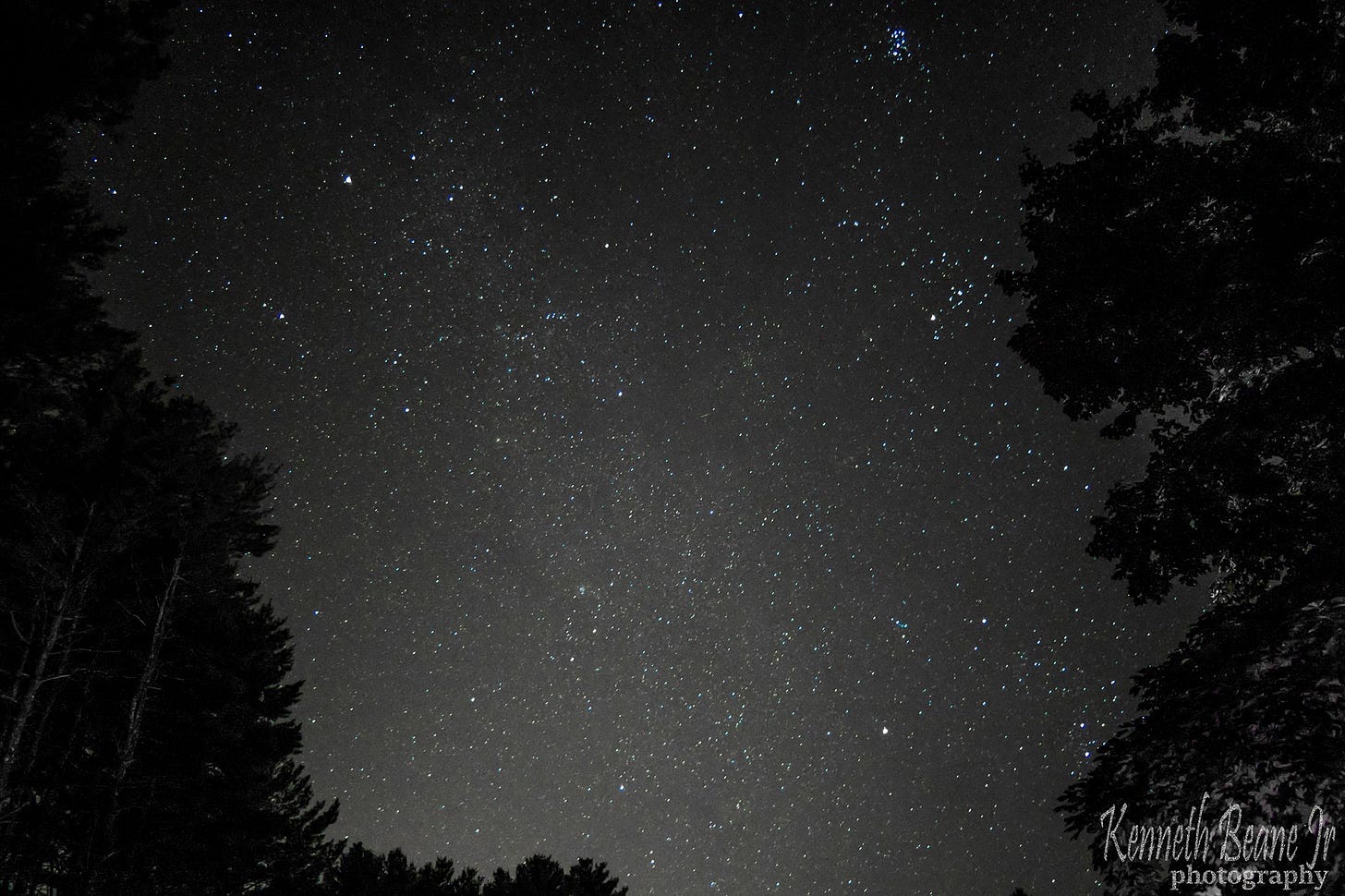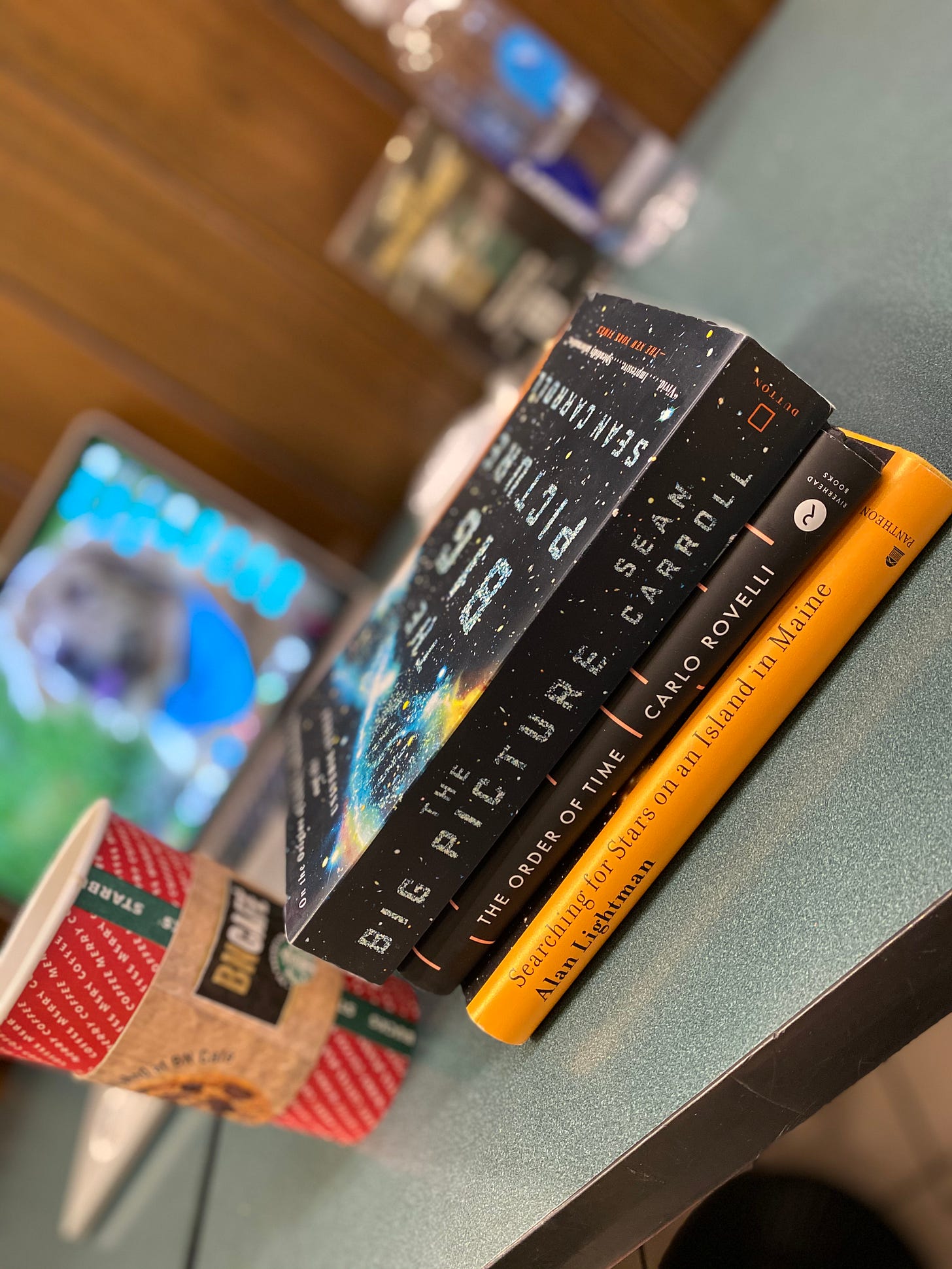The microscopic and the infinite
We're made up of the same particles that make up stars and microbes.
Happy Monday, friends. For this newsletter, I wrote about the universe; how it’s limitless, and also the microscopic. This newsletter was written while listening to the Interstellar soundtrack by great Hans Zimmer, which I highly recommend for productivity. Also, I wrote about my favorite pieces from 2019 for my CF News Today column Mutations & Conversations so feel free to check that out.

A beautiful astrophotography photo from my friend (Patriots fan) Ken Beane. Check out his work.
We are a way for the universe to know itself. Some part of our being knows this is where we came from. We long to return. And we can, because the cosmos is also within us. We're made of star stuff.
Carl Sagan
The human brain is remarkable. It is an organ; just as the heart, lungs, and pancreas are all organs. Organs are composed of tissues and tissues are made up of cells. As we zoom inward within each organ, they don’t look too different on a cellular level. Think of the Empire State Building and a school; they are both buildings, but they appear different and have different functions because of how and why they are built. Organs appear and function differently because of how they are composed.
This is true for all of matter. If you break down any object in the entire universe, they are composed of molecular compounds, which are composed of elements, which are composed of electrons and protons and neutrons and other subatomic particles. That the human brain is composed of the same “stuff” that makes up planets and buildings and stars and dogs and microbes is striking and strange and beautiful; that the human brain gives rise to the mind and that the mind can then conceive of theories of the microscopic and the infinite is doubly beautiful.
Science can end up sounding borderline supernatural and scientists can almost sound like religious zealots. Science is thorough, comprehensive, self-regulating, and pure. The scientific process, on the other hand, can be ugly. The concepts we have come to understand—subatomic particle physics and astrophysics alike—are heavily researched and vetted. They weren’t off-handedly proposed and accepted; they were proposed, researched, challenged, questioned, theorized, defended, and everything else you can imagine of. The accepted way of the world used to be that the earth was flat and it was once believed that the sun rotated around the earth. Many religious beliefs came to be because it helped explain why we exist at all. People were both philosophers and mathematicians; they were priests and scientists. It should probably be assumed that some beliefs we have about the world today will one day seem laughably wrong, just as many of their beliefs once were.

Three of my favorite books about these topics. Highly recommend all three. I will begin reviewing books I read on Goodreads if you’re interested.
To me, this is not an indictment of science. Since ideas are built upon ideas, that some theories will eventually be shown to be empirically wrong (empirically means “by experimentation or observation”) does not defeat the entire enterprise. Theories aren’t immediately accepted upon proposal or overnight; it takes years and sometimes decades from them to go from fringe beliefs to en vogue. Science as an endeavor is so self-regulating in fact, that the fact that theories go from being accepted (note: this does not mean they are definitively proven; in science, we avoid the term “proven”) to empirically wrong is more of an endorsement of its success.
I chose to study chemistry and biology eight years ago out of a quintessentially human desire: a desire for control. I wanted to have knowledge—and by extension, control— over the defective protein that I believed would one day cause my demise. I’ve thought a lot about that over the years. I’ve been curious for my entire life. I can remember asking my parents questions as a kid and Alyssa saying they were dumb questions (lol). But humans strive for control every single day; powerlessness is maybe the scariest emotion for humans to feel. My desire to understand CF—and science as an endeavor—is about control. Humans seek control through science, through religion, through daily habits, both good and bad.
It’s odd to consider that I began studying chemistry to understand what is so difficult to understand: why I was born with a built-in ticking time bomb. Genetic diseases are quirks of our DNA. They exist because thousands and thousands of years ago, a random mutation popped up that benefited some of our ancestors. Hundreds of thousands of years are a mere blip in the history of time; humans hardly register in the history of the universe.
As such that perspective is everything, it’s also everything when it comes to time and space. Meaning itself is dependent on perspective. When we’re young, everything seems more intense, more meaningful. School days and summers last an eternity. Missing out on something with our friends sucks and it’s hard for us to grasp that things will get easier as we grow older. And then, as we grow older, it seems funny to think we ever lost sleep about things so meaningless. We look back on days that seemed terrible and realize, in hindsight, they weren’t that big of a deal. Time begins to speed up, or at least we perceive it as such. It’s often why we look back at the past with such nostalgia; of course we think that one summer was perfect because we’re only remembering the best parts of it and dismissing that we were anxious about the future.
We can look at our lifetimes and the lifetime of the universe in the same way we looked at buildings and organs. As you zoom inward, as every organ and building, every day begins to look the same. Nothing really changes from day to day in our lives; changes happen over weeks, months, years. This is even truer for a day when you consider the entirety of the universe; since days are a human construct, when you consider the vastness of the universe, all of its planets, stars, galaxies, black holes, time itself ceases to exist. If our planet is so insignificant, what does that say about each of our lives?
It’s breathtaking to consider the vastness and longevity of the universe. Its size is so incomprehensibly large; the vast majority of its existence will likely be without humans, both before and after our species’ existence. Science can begin to make humans feel so powerless, so insignificant that there is no point to anything. It’s hard not to be a nihilist as a scientist. The influence we hold over the people we know is immense; yet, the influence we hold on the universe altogether is zilch.
Life is a tragic, beautiful paradox: We’re powerful to others and powerless to the universe; we are immense to microbes and minuscule to the scars; we’ve vanquished diseases and we’ll likely succumb to the Sun’s death or our own hand. Our lives can either all matter, or not matter at all. What a terrifying possibility, that we are meaningless. And yet, life is about perspective.
We may be a mere blip in the history of the universe. We may or may not (I lean towards we’re not) be the only living things in the entire universe. The fact that we—both our bodies and what gives rise to our literal sense of self—are composed of the same particles that make up stars and microbes is absolutely remarkable. We as a species have evolved from multicellular organisms to basic intelligence to the ability to take photos of stars—such as the image at the top—and cells—such as the photo below—that all surround us.
As for perspective, that photo below is called a spheroid; it is derived from nasal cells from a person with cystic fibrosis. At my research job, we take these spheres and we stimulate them with FDA–approved small molecules called modulators (such as Trikafta, Orkambi, Kalydeco, and Symdeko). If the spheres grow, well, that indicates that the broken protein CFTR which causes CF has been at least partially corrected. These human-discovered compounds don’t cure CF, but they interact with the protein and improve its function, in turn reducing the burden of CF on the patient. This microscopic spheroid is comprised of the same particles as the stars that light the night sky and it’s being observed by a human brain and eyes, which are also made up of those same particles. Nearly a decade ago when I realized my love for science, I would’ve never imagined I’d be here, writing about science or being a scientist at all. There was no one day where everything changed, but everything has changed, at times much to my dismay and at others much to my happiness.

We give meaning to what we want to. We can choose to believe that our short lifetimes are meaningless in the timeline of the universe. Or we can choose to recognize that it’s beautiful that we are even capable of observing the universe, considering the bond between all particles that make up every bit of the universe. The particles that make us have always been present in the universe, and long after we’re gone, they will remain, scattered. What matters is how we use the time we’re given as self-aware stardust. Suddenly, from that perspective, I think you start to recognize just how lucky each and every one of us is.
Thanks for reading, as always. If this made you think about life or the universe, make sure you let me know by responding to this email or by messaging me directly. And be sure to share. :)
tl



